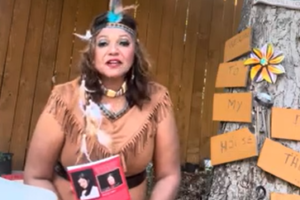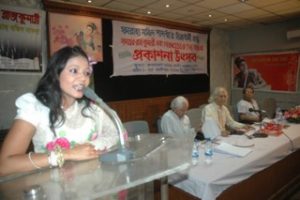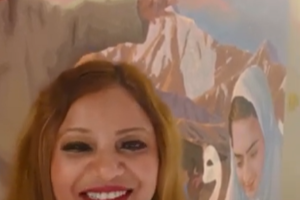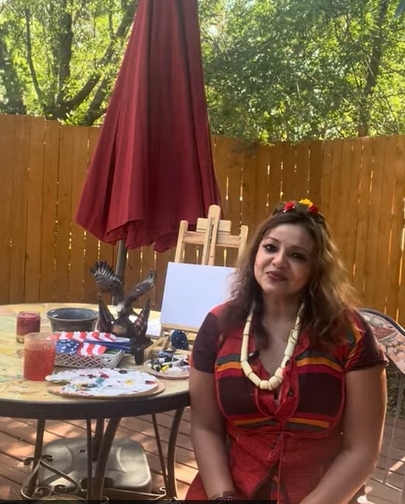Two MPs belonging to India’s ruling party have been removed from a list of “star campaigners” after comments they made against a group or protesters.
Anurag Thakur and Parvesh Varma, have been penalised for their comments against thousands of largely Muslim women who have been staging a demonstration in Shaheen Bagh – a Muslim-dominated neighbourhood in the capital, Delhi.
Elections will be held there on 8 February,
The polls pit the Bharatiya Janata Party (BJP) which runs India’s government, against the Aam Aadmi Party (AAP) which governs Delhi. The AAP, headed by charismatic chief minister Arvind Kejriwal, is hoping to return to power, pointing to its record on affordable healthcare, education, electricity and water.
The BJP has accused the protesters of being “traitors” to India.
What did the BJP say?
The charge levelled at the women protesting against the Citizenship Amendment Act (CAA) has been led by the home minister, BJP president Amit Shah.
He told supporters to press the button for the BJP with “so much anger that protesters in Shaheen Bagh feel the current”.
Other party leaders have followed suit.
Anurag Thakur, the junior finance minister, was censured by the election commission after he incited the crowd at an election rally to shout “shoot the traitors” while railing against those at Shaheen Bagh. He defended his comments by saying he was merely reflecting the “mood of Delhi”.
Yogi Adityanath, the chief minister of neighbouring Uttar Pradesh, said the men of Shaheen Bagh were sending their women out to protest while they stayed home and slept, because they were too afraid to come out themselves.
Yet another minister, Parvesh Varma, swore the protesters would be “sent packing” within hours of a BJP victory, adding that if left unchecked, they would “rape and kill”.
Other party members have called the election a battle between “India and Pakistan”, which critics have denounced as a clear attempt to stigmatise Muslims.
So, what is happening in Shaheen Bagh?
Residents, mostly Muslim women, have been staging a continuous sit-in on a public road for more than a month.
Videos from Shaheen Bagh show women singing songs, clapping and passing tea and food to one another.
It has been a rare moment – one of the few times anyone can remember India’s Muslim women coming out in such large numbers and leading a movement of this nature, although many others from different religions have sat alongside them in solidarity. They have read each other the preamble of India’s constitution, made speeches reaffirming their citizenship and sung patriotic songs.
Shaheen Bagh has captured the imagination of many Indians.
The peaceful nature of the demonstrations have been in stark contrast to other protests against the citizenship law in which more than 30 people have been killed – most of them in Uttar Pradesh state – and the police accused of brutality.
The BJP for its part has painted the Shaheen Bagh protesters as extremists, who are seeking to break the country apart with the support of the AAP and its leader, Arvind Kejriwal.
What is the CAA?
The act offers amnesty to non-Muslim illegal immigrants from three neighbouring Muslim-majority countries.
It amends India’s 64-year-old citizenship law, which currently prohibits illegal migrants from becoming Indian citizens.
It also expedites the path to Indian citizenship for members of six religious communities – Hindu, Sikh, Buddhist, Jain, Parsi and Christian – if they can prove they are from Pakistan, Afghanistan or Bangladesh. They will now only have to live or work in India for six years – instead of 11 years – before becoming eligible to apply for citizenship.
Under the CAA people holding Overseas Citizen of India (OCI) cards could lose their right to live and work in India indefinitely if they break local laws, no matter how minor the offence.
Several petitions argue that the law is illegal, claiming that it grants citizenship on the basis of religion – which goes against the country’s secular values enshrined in its constitution. Those challenging it include political parties, civil society and Muslim groups.
Adding to the fears is a government pledge to carry out a widespread exercise to weed out “infiltrators” from neighbouring countries. Many Muslim citizens fear they could be made stateless, given that the exercise relies on extensive documentation to prove their ancestors lived in India.
The government has defended the law, saying it will give sanctuary to people fleeing religious persecution and Mr Shah has vowed that it will not be rolled back.
Why is Shaheen Bagh being targeted?
“What the BJP is trying to do is very clear. Polarisation is a tried and tested method that has won them elections in the past. But the million dollar question is, will it also work in Delhi?” political commentator Neerja Chowdhury told the BBC.
Many critics have said the protesters are an easy target for the Hindu nationalist BJP, as they are largely Muslim, and have said they demonstrate precisely why Muslims are afraid of the CAA.
The BJP comments have also caused a stir on social media. Although there are some who agree with the criticisms against the protesters, many say it is a clear indication the BJP has been rattled by Shaheen Bagh.
AAP supporters say the BJP’s tactics show how desperate the party is to avoid defeat.
The hashtag #KejriwalAgainstEntireBJP was the top India trend on Tuesday afternoon.
Ms Chowdhury said that although it was expected the BJP would come out strongly as the election drew nearer, she was still surprised by the tone of the campaign.
“We have had many lows in Indian politics and electioneering. But I don’t ever remember a legislator telling people that they would be raped and killed,” she said.
Source: BBC






















